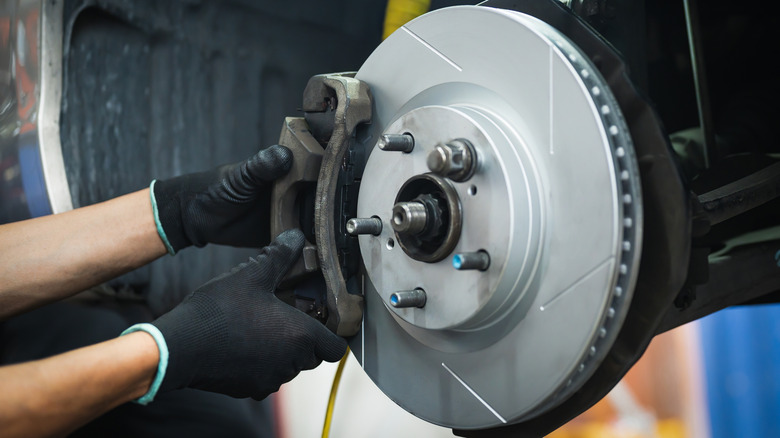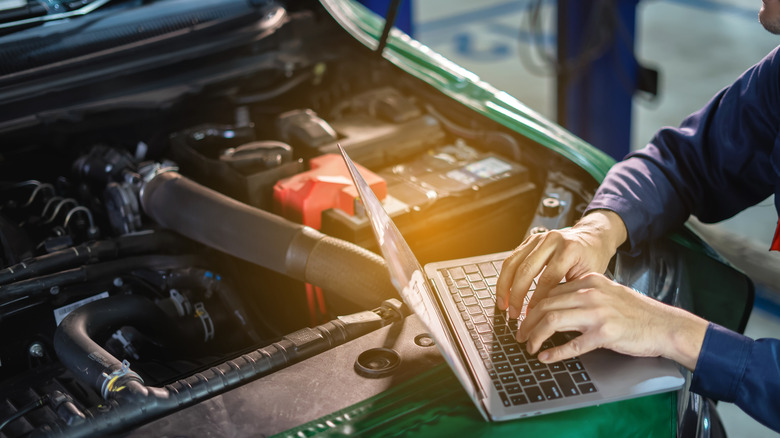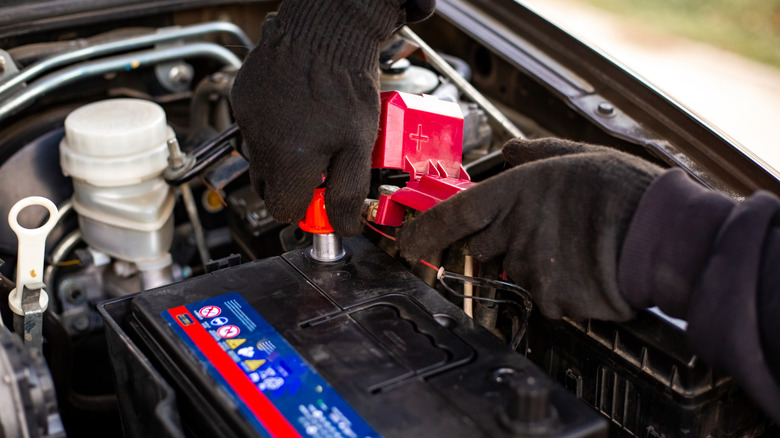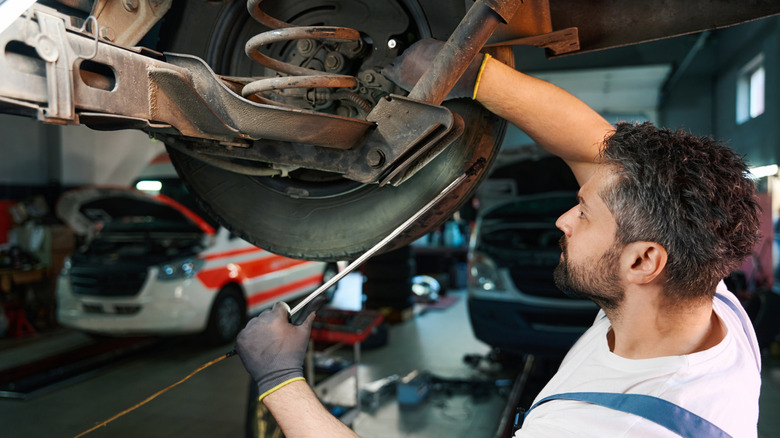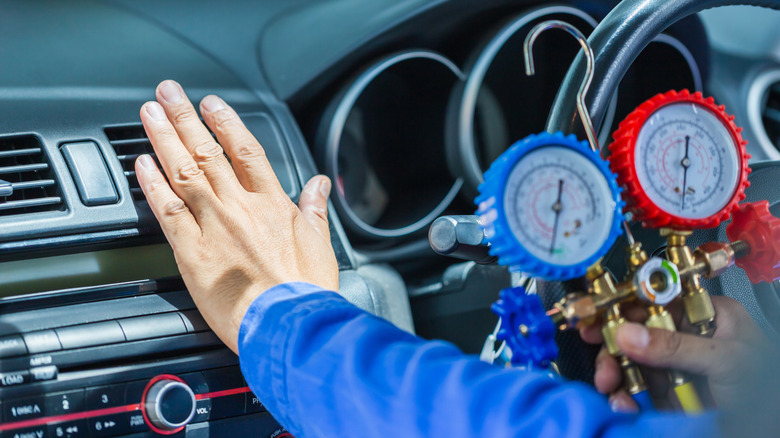5 Common Car Repairs Your Mechanic Might Be Overcharging For
There's nothing quite like that call from your mechanic — the tone just serious enough, the wording vague enough, and the quote just high enough to make you raise an eyebrow. "We noticed some issues while we were under there," they'll say, like they're doing you a huge favor. But sometimes, what they really notice is an uninformed driver who's unlikely to question the quote, and some take advantage of that.
When you're in charge of keeping dozens of company vehicles roadworthy without blowing the budget, as I have been, you learn quickly which repairs are urgent, which are optional, and which are pure theater. Shops aren't always out to scam you, don't get me wrong, but upsells and unneeded "extras" are more common than most drivers realize. So, it's not about skipping maintenance — in fleet work, that was non-negotiable — this is about knowing enough to separate the necessary repairs from smoke and mirrors deliberately dressed up in technical jargon.
Borrowing from my professional experience in fleet maintenance and other industry insights, the next sections will break down common repairs that customers are often overcharged for and how to push back when auto repair shops and mechanics try to rip you off.
Brake jobs: the classic overcharge
Rotors, brake pads, labor, and an occasional flush of your brake fluid (which you can DIY) are all fair game. However, something is up when a $300 brake pad change ends up costing $900.
Sure, brakes are non-negotiable for any vehicle that goes on the road. But in my experience, I've come across many quotes for mid-duty trucks with inflated line items like "caliper service" or "brake hardware kit." Passenger vehicles have it even worse. Many shops push replacing the rotors when resurfacing would have worked just fine, particularly in instances when the rotors have worn unevenly or warped from heat, without the extra cost of new rotors.
According to AutoZone, the cost of a professional brake pad swap usually runs from $115 to $270 per axle, depending on the parts you choose and labor costs in your area. The pads alone usually cost between $30 and $75 each, with an additional $150 to $200 for labor. For a full brake overhaul, the cost should range from $300 to $800. And if you're driving a high-end or complicated vehicle, the total can quickly top $1,000, courtesy of expensive parts and labor-intensive repairs.
Request the part numbers they are quoting, then compare them to those from OEMs or reputable aftermarket vendors like Raybestos or Brembo. By sourcing parts myself, I was able to cut repair costs by 23% for the first year, 16% within the first four months.
Engine Diagnostics: overspending on a code scan
Mechanics know how much worry a check engine light can cause. The fact is, however, that obtaining codes from an OBD-II system requires no wrench turning and takes less than two minutes. Yet, some garages charge more than $100 just to scan and "interpret" those codes. We used less than $200 worth of gear to perform our own diagnostics in a commercial fleet environment. Modern code readers, even consumer-grade ones, can read and translate most trouble codes effortlessly. For less than $100, OBD scanners from brands like BlueDriver and FIXD can connect to your phone and provide you with detailed explanations.
The tough part now is interpretation. Yes, a single code may indicate several problems, but skilled technicians should identify the issue without forcing you to pay for further examination. If the diagnostic charges exceed $100 and are not deducted from the repair cost, that's a red flag.
Ask questions. What code did they pull? What does it usually mean? And what's the most likely underlying cause? If the mechanic starts acting cagey or evasive, chances are they're trying to pad the labor. That's why investing in a diagnostics scanner and getting familiar with your own car's peculiarities is a smart move. It won't automatically turn you into Bob the mechanic, but it could come in handy, preventing you from heedlessly signing off on a costly repair just because your engine light blinked.
Battery replacement: more than a simple drop-in
Even though battery replacements are often deemed quick and easy — which they are — some shops nevertheless tack on labor charges or push for pricier alternatives. Swapping most batteries, including those on newer vehicles with retained power systems or ECM resets, should take 15 to 30 minutes.
Battery health is a line item that we constantly monitor in fleet management. I can attest to the fact that brand-name markup is real because I have tested and specified replacements for dozens of trucks myself. For most auto parts stores, a battery purchase tends to include a free installation, which saves you the trouble. However, not all shops do free installations, so with just basic tools, you can install a battery yourself. Just make sure to recycle the old battery by returning it to the shop; most apply a "core" fee to the purchase price, which is reimbursed when you return the old battery.
So, while you're at it, find out which brand and capacity of battery they are using, then compare prices yourself. Additionally, ask if any resets are really required or if that's just boilerplate. I've occasionally had technicians quote reset processes that were completely irrelevant to that particular vehicle. It's one of those fixes that, although seemingly minor, may quickly mount up if you're not paying attention.
Suspension repairs: where preventive becomes profitable
Worn suspension parts are key to a car's safety and ride quality, and you shouldn't overlook them. However, they are a popular upsell zone. I've seen service writers replace the entire strut when it was only the bushings that were worn, and sometimes they weren't even leaking.
In the fleet environment, we record each bang, shimmy, and uneven tire wear. And by doing so, you quickly learn to tell between a needless upsell and tired shock. Control arms, tie rods, and struts don't all break at once, but that's how many mechanics and auto shops sell their repair packages: all-or-nothing, which just doesn't make sense, at least not every time.
AutoNation Mobile Service estimates suspension repairs to cost between $1,000 and $5,000, a chunk of which is often unnecessary. If your car has suspension troubles, ask for specifics. What exactly is worn or broken? Are there visible cracks, leaks, or maybe too much play in the tie rods? Even better, ask the mechanic to show you, even if only a photo, though this should be standard practice for any shop worth its salt. If nobody offers to show you anything, that could be a sign of something fishy.
I learnt from my own purchasing days to never accept subpar parts simply because the price is high. Shops occasionally charge premium prices and still end up using generic parts. So, always ask for the part brand and warranty terms just to perform due diligence.
AC repairs: small leaks, big bills
Broken ACs are another golden goose for repair shops and mechanics who exploit uninformed car owners. I've seen some pay upwards of $1,500 for "full AC service," when all their car needed was a recharge and a $20 O-ring replacement.
In the garage, we employed UV dye and refrigerant sniffers to precisely identify leaks. It simply requires patience. Nonetheless, many quick-lube spots and chains choose to skip diagnostics entirely and reach the conclusion that the condenser or sometimes the compressor needs to be replaced. With labor, that can easily run over $1,000.
How much should AC repairs cost? A recharge should cost somewhere between $250 and $300, depending on the equipment used and expertise required, as per Kelley Blue Book estimates. But once the narrative changes to AC compressor replacement, you'll no longer be looking at a few hundred-dollar job, but one that can cost you between $1,550 and upwards of $1,700.
The "AC inspection" is another snare. It's often a vague service that only leads to an extra charge. Always inquire about the exact tests that will be carried out and whether diagnostics are included. Can't spot any leak? Request an electronic leak detector or UV dye tracking, which shouldn't be a problem for a serious auto repair shop. Here's a fleet-tested rule: don't replace any of your AC components until you pinpoint the leak. Fail to do that, and all you'll be doing is engaging in a costly game of whack-a-mole.

